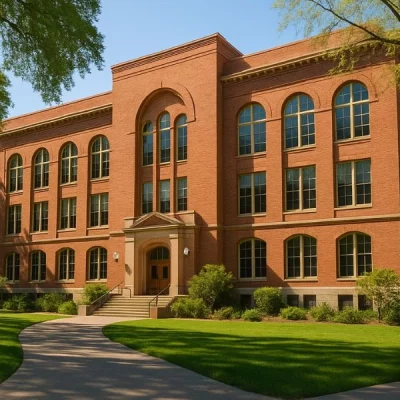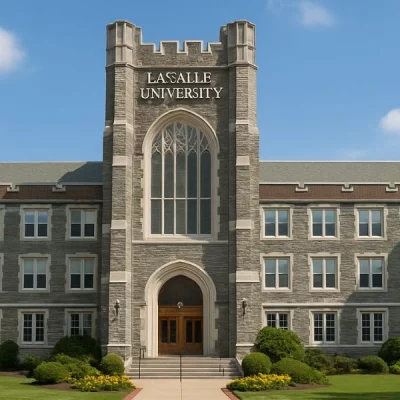Top 50 Civil Engineering Universities in USA for 2025
Table of Contents
Dreaming of designing eco-friendly cities, or creating bridges that last generations? Then civil engineering might just be your perfect path—and the USA is one of the best places to start. With world-class universities, and endless opportunities to get hands-on experience, studying civil engineering in the U.S. gives you both the knowledge and the tools to make a real impact. In this guide, we’ll walk you through everything you need to know—from why the U.S. is a top destination for engineering students, to a full list of the top 50 universities, plus admission tips, tuition costs, and financial aid options.
Studying in the USA? Secure your accommodation hassle-free today!
Why Study Civil Engineering in USA?
Thinking about becoming a civil engineer and wondering where to study? The USA might just be your perfect destination. From skyscrapers and bridges to smart cities and eco-friendly buildings, the U.S. is packed with real-life examples of engineering brilliance—and it’s also home to some of the world’s best civil engineering schools.
Studying civil engineering in the US means you’ll not only learn from top professors but also gain real experience, work on big projects, and open doors to exciting job opportunities all around the world. Let’s take a look at why the U.S. stands out when it comes to civil engineering education:
- Top-Quality Education: The U.S. is home to many of the world’s top-ranked universities. These schools offer programs that mix theory with hands-on learning, so you’re not just reading about bridges—you’re designing them!
- Lots of Research Opportunities: Love solving problems? U.S. universities are big on research. You can get involved in real projects about climate-resilient buildings, clean water systems, green materials, and more.
- Strong Links with Industry: Many schools have partnerships with major engineering firms. That means more chances for internships, job placements, and co-op programs where you work while you study.
- Diverse and Flexible Learning: You’ll meet people from all over the world and get to choose from a variety of courses that match your interests—whether that’s transportation, environmental engineering, or structural design.
Civil Engineering in the USA: Key Highlights
| What You Need to Know | Details |
| Number of Programs | 150+ accredited programs |
| Degrees Offered | BSc, BEng, MSc, MEng, PhD |
| Study Duration | Bachelor’s: 4 years Master’s: 1–2 years |
| Average Tuition Fees | Bachelor’s: $40,000–$60,000/year Master’s: $35,000–$50,000/year |
| Work Opportunities | Internships, co-ops, OPT (for international students) |
| Top Employers | AECOM, WSP, Bechtel, Arup, Turner Construction |
Top 50 Civil Engineering Universities in the USA (2025)
Planning to study civil engineering in the United States? You’re not alone! With the U.S. being a global leader in infrastructure development, innovation, and engineering research, it’s a top destination for aspiring civil engineers. But choosing the right university isn’t just about prestige—it’s also about finding the best value for your investment. To help you make a smart, informed decision, we’ve created this comprehensive and easy-to-follow table of the Top 50 Civil Engineering Universities in the USA for 2025:
| Rank | University Name | Location | In-State Tuition | Out-of-State Tuition |
| 1 | University of California – Berkeley (UC Berkeley) | Berkeley, California | $14,226 | $43,980 |
| 2 | Stanford University | Stanford, California | N/A | $56,169 |
| 3 | Massachusetts Institute of Technology (MIT) | Cambridge, Massachusetts | N/A | $53,790 |
| 4 | University of Illinois at Urbana-Champaign | Urbana-Champaign, Illinois | $17,348 | $36,068 |
| 5 | Georgia Institute of Technology (Georgia Tech) | Atlanta, Georgia | $12,682 | $33,794 |
| 6 | University of Texas at Austin | Austin, Texas | $10,824 | $38,326 |
| 7 | University of Michigan – Ann Arbor | Ann Arbor, Michigan | $15,558 | $51,200 |
| 8 | Purdue University – West Lafayette | West Lafayette, Indiana | $9,992 | $28,794 |
| 9 | University of California – Davis (UC Davis) | Davis, California | $14,226 | $43,980 |
| 10 | Texas A&M University – College Station | College Station, Texas | $12,153 | $38,602 |
| 11 | University of Southern California (USC) | Los Angeles, California | N/A | $59,260 |
| 12 | University of California – Los Angeles (UCLA) | Los Angeles, California | $13,804 | $44,830 |
| 13 | University of Washington – Seattle | Seattle, Washington | $12,076 | $39,906 |
| 14 | Columbia University | New York, New York | N/A | $63,530 |
| 15 | Northwestern University | Evanston, Illinois | N/A | $60,768 |
| 16 | Pennsylvania State University | University Park, Pennsylvania | $18,450 | $35,514 |
| 17 | University of Florida | Gainesville, Florida | $6,381 | $28,659 |
| 18 | New York University (NYU) | New York, New York | N/A | $56,500 |
| 19 | Northeastern University | Boston, Massachusetts | N/A | $55,452 |
| 20 | University of California – San Diego (UCSD) | San Diego, California | $14,733 | $44,487 |
| 21 | University of Maryland – College Park | College Park, Maryland | $10,779 | $36,891 |
| 22 | University of Wisconsin – Madison | Madison, Wisconsin | $10,725 | $37,785 |
| 23 | University of Minnesota – Twin Cities | Minneapolis, Minnesota | $15,027 | $33,325 |
| 24 | Ohio State University | Columbus, Ohio | $11,518 | $33,502 |
| 25 | University of Colorado Boulder | Boulder, Colorado | $12,500 | $38,318 |
| 26 | University of Pittsburgh | Pittsburgh, Pennsylvania | $19,718 | $33,746 |
| 27 | Virginia Tech | Blacksburg, Virginia | $14,175 | $33,857 |
| 28 | University of Arizona | Tucson, Arizona | $12,716 | $36,743 |
| 29 | University of Iowa | Iowa City, Iowa | $9,606 | $31,569 |
| 30 | University of Kansas | Lawrence, Kansas | $11,166 | $28,034 |
| 31 | University of Nebraska – Lincoln | Lincoln, Nebraska | $9,522 | $26,820 |
| 32 | University of Oklahoma | Norman, Oklahoma | $11,763 | $27,144 |
| 33 | University of Tennessee – Knoxville | Knoxville, Tennessee | $13,264 | $31,684 |
| 34 | University of Utah | Salt Lake City, Utah | $8,615 | $27,220 |
| 35 | University of Central Florida | Orlando, Florida | $6,368 | $22,467 |
| 36 | Clemson University | Clemson, South Carolina | $15,558 | $38,550 |
| 37 | Colorado State University | Fort Collins, Colorado | $12,260 | $31,540 |
| 38 | Drexel University | Philadelphia, Pennsylvania | N/A | $54,516 |
| 39 | Illinois Institute of Technology | Chicago, Illinois | N/A | $50,490 |
| 40 | Iowa State University | Ames, Iowa | $9,320 | $24,508 |
| 41 | Michigan State University | East Lansing, Michigan | $14,460 | $39,766 |
| 42 | North Carolina State University | Raleigh, North Carolina | $9,101 | $29,220 |
| 43 | Oregon State University | Corvallis, Oregon | $11,715 | $31,215 |
| 44 | Rutgers University | New Brunswick, New Jersey | $15,407 | $32,189 |
| 45 | San Diego State University | San Diego, California | $7,510 | $19,390 |
| 46 | Syracuse University | Syracuse, New York | N/A | $55,920 |
| 47 | University at Buffalo | Buffalo, New York | $10,524 | $28,194 |
| 48 | Washington State University | Pullman, Washington | $12,170 | $27,113 |
| 49 | University of Virginia | Charlottesville, Virginia | $18,960 | $52,843 |
| 50 | Rice University | Houston, Texas | N/A | $54,100 |
Spotlight on the Top 10 Civil Engineering Programs in USA
If you’re dreaming of designing tomorrow’s cities, building climate-resilient infrastructure, or managing massive construction projects, choosing the right university is your first blueprint to success. In the United States, civil engineering isn’t just a degree—it’s a launchpad into a high-impact, high-opportunity career.
The top civil engineering programs in the U.S. are more than just academic powerhouses—they’re innovation ecosystems where future engineers work on cutting-edge technologies, collaborate across disciplines, and connect directly with global industry leaders. Here’s a closer look at what makes the Top 10 Civil Engineering Universities stand out:
| Rank | University | Key Features | Average Starting Salary |
| 1 | MIT (Massachusetts Institute of Technology) | Cutting-edge labs, interdisciplinary collaboration with CS and urban planning, and close industry partnerships. Students work on real-world problems like autonomous infrastructure and disaster-resilient systems. | $75,000–$85,000 |
| 2 | Stanford University | Known for its leadership in earthquake engineering and AI-driven modeling. The campus supports innovation with startup incubators and a design-thinking approach. | $74,000–$82,000 |
| 3 | UC Berkeley | A pioneer in sustainability and smart infrastructure. Students engage in major Bay Area projects and collaborate on climate-resilient design and policy. | $72,000–$80,000 |
| 4 | Georgia Tech | Offers strong co-op programs and hands-on construction management training. Its location in Atlanta provides access to diverse infrastructure projects. | $70,000–$78,000 |
| 5 | University of Illinois Urbana-Champaign | Highly respected faculty, robust alumni network, and deep specialization in structural and transportation engineering. The program emphasizes analytical thinking and design innovation. | $69,000–$77,000 |
| 6 | Caltech (California Institute of Technology) | Small but elite, with unique focuses in environmental sustainability and geotechnical systems. Great for students seeking research intensity and personalized mentorship. | $70,000–$75,000 |
| 7 | Carnegie Mellon University | Known for integrating civil engineering with data science, IoT, and smart city development. It houses multiple innovation hubs and collaborative labs. | $71,000–$79,000 |
| 8 | University of Michigan – Ann Arbor | Blends technical rigor with public infrastructure planning. Offers global exchange programs and interdisciplinary design labs. | $69,000–$76,000 |
| 9 | Texas A&M University | Specializes in coastal, geotechnical, and transportation systems. Students benefit from state-funded infrastructure projects and competitive research assistantships. | $68,000–$75,000 |
| 10 | Purdue University | Known for its applied approach to infrastructure analytics, practical studios, and research centers for construction innovation. | $67,000–$74,000 |
Admission Criteria for Top U.S. Civil Engineering Universities
If you’re aiming to study civil engineering at one of the top universities in the United States, it’s important to know what they’re looking for. These schools receive thousands of applications each year, so standing out means more than just having good grades. Top civil engineering programs want students who are:
- Academically strong in math, science, and problem-solving subjects.
- Curious about how the world is built—like roads, bridges, buildings, and cities.
- Interested in tackling real-life challenges such as climate change, disaster recovery, or green construction.
Whether you’re applying for a bachelor’s (BSc/BEng) or a master’s (MSc/MEng) degree, schools look for a combination of academic performance, test scores, communication skills, and practical experience. Showing genuine interest through personal projects, internships, or volunteer work can make your application stand out even more. Following are the typical admission requirements for Top US Civil Engineering Universities:
| Criteria | Undergraduate (BSc/BEng) | Post Graduate (MSc/MEng) |
| GPA | 3.5+ (out of 4.0) | 3.0–3.5+ |
| Standardized Tests | SAT: 1350–1550 ACT: 30–34 | GRE: 310–325 (Many top schools now waive this requirement) |
| English Proficiency | TOEFL: 90–100 IELTS: 6.5–7.5 | Same as undergrad |
| Letters of Recommendation | 2–3 from teachers or mentors who know your work ethic | 2–3 from professors or professionals in your field |
| Statement of Purpose | Not always required, but recommended for competitive schools | Required—this is where you tell your story and goals |
| Portfolio / Experience | Optional, but helpful if you have project work or competitions | Strongly recommended—internships, research, or fieldwork |
Tuition Fees and Financial Aid Options for Civil Engineering Students in USA
Studying civil engineering in the U.S. is a big step—and yes, it comes with a cost. But think of it as an investment in your future. Civil engineers are in high demand worldwide, and U.S. degrees are highly respected. Whether you’re dreaming of designing smarter cities or building safer bridges, the education you get in the U.S. can open doors to high-paying, impactful careers. That said, tuition fees can vary widely depending on the university and whether you’re an in-state or international student. Below is the cost comparison and financial aid opportunities for Civil Engineering Students in USA:
| University Tier | Avg. Annual Tuition (UG) | Avg. Annual Tuition (Grad) | Scholarships/Grants Available? |
| Ivy League / Top 5 | $55,000–$65,000 | $50,000–$60,000 | Yes (merit + need-based) |
| Public Flagships (e.g., UT Austin, UCLA) | $35,000–$45,000 | $30,000–$40,000 | Yes (in-state tuition, TA/RA positions, honors aid) |
| Mid-Tier Public Universities | $25,000–$35,000 | $20,000–$35,000 | Yes (departmental aid, scholarships, external grants) |
Conclusion
And there you have it—your full guide to the Top 50 Civil Engineering Universities in the USA for 2025! From top-ranked schools like MIT and Stanford to affordable, high-quality public universities like Purdue and UT Austin, you’ve got plenty of fantastic options to choose from. Remember, the “best” university isn’t just about rankings. It’s about what fits you—your goals, your budget, your learning style, and your dreams. So start shortlisting, start planning—and get ready to build your future from the ground up!
Frequently Asked Questions
What are the top civil engineering universities in the USA for 2025?
The top civil engineering universities in the USA for 2025 include:
University of California – Berkeley (UC Berkeley)
Stanford University
Massachusetts Institute of Technology (MIT)
University of Illinois at Urbana-Champaign
Georgia Institute of Technology (Georgia Tech)
University of Texas at Austin
Why should I study civil engineering in the USA?
The USA offers top-quality education with programs that blend theoretical knowledge and practical experience. Students have access to numerous research opportunities in areas like climate-resilient buildings and green materials. Strong industry links provide avenues for internships and job placements, and the diverse, flexible learning environment allows for specialization in various fields such as transportation and environmental engineering.
What degrees are offered in civil engineering in the USA?
U.S. universities offer a range of degrees in civil engineering, including:
Bachelor of Science (BSc)
Bachelor of Engineering (BEng)
Master of Science (MSc)
Master of Engineering (MEng)
Doctor of Philosophy (PhD)
How long does it take to complete a civil engineering degree in the USA?
Bachelor’s Degree (BSc/BEng): Typically takes 4 years of full-time study.
Master’s Degree (MSc/MEng): Usually takes 1 to 2 years depending on the program type.
A research-focused Master of Science (MSc) might take closer to 2 years, while a course-based Master of Engineering (MEng) can often be completed in 12–18 months.
What are the average tuition fees for civil engineering programs in the USA?
Undergraduate Programs (Bachelor’s): Expect to pay around $40,000–$60,000 per year, depending on whether you’re attending a public or private university. Public schools offer lower tuition for in-state residents.
Graduate Programs (Master’s): Tuition for master’s degrees typically ranges from $35,000–$50,000 per year. Some programs may also offer scholarships, research assistantships, or teaching assistant positions to help reduce costs.







